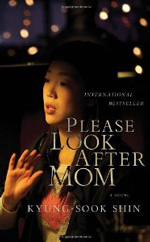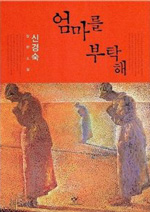
One afternoon in 2007, an elderly woman disappears from a Seoul train station. During their attempts to find her, her husband and adult children reflect on what they actually knew about their wife and mother. It turns out, not much. The story unfolds as told by her eldest daughter, her eldest son, her husband, and herself. I'm endlessly fascinated by stories of mothers who disappear. Did something happen to trigger her to run away? Did she meet with foul play? There are so many options, all of them interesting. The premise and structure are intriguing and hold so much promise. Many readers agree, as this novel has already sold over a million copies in South Korea, and has now been translated into nineteen languages.
Please Look After Mom is unlike any book I've read before. Although the language and sentence structure are straightforward, the book is not simplistic; a close reader will pick up hints that there is more behind the obvious guilt and grief that washes over every page. But what makes this book so unusual, and what made me struggle, are the voices the author uses in each section. The story is told using alternating narrative points of view, with the author favouring the highly unusual first person imperative. It reads as if she's drawing you personally into the family drama. This voice seems to point its finger directly at you, the reader, telling you how you felt, and accusing you of an array of poor behaviour: "what were you doing instead?" "it never occurred to you," "only now do you realize, painfully, that you turned a blind eye to your wife's confusion." Over and over again, you feel scolded for "your selfishness" and told "how selfish you were." This odd way of trying to make me an accomplice in the characters' guilt and pain did not elicit my sympathies. Instead of drawing me into the story, I found it alienating.
In writing the eldest son's section, Shin switches to the third person, and the overall effect is much gentler. The eldest son has an esteemed position in a Korean family, so he escapes criticism and comes off looking faultless.
When we finally get to hear Mom's voice in section four, I was disappointed that rather than tell us what happened to her, she immediately starts a mental conversation with her younger daughter. Unfortunately, like her family's musings, Mom's thoughts are of the past and little is revealed about the present.
The circumstances surrounding Mom's disappearance—what I was most interested in—turn out to be background for this novel. The book isn't a mystery; instead it's a collection of reflections and memories. Astonishingly, reflecting and remembering seem to be completely new mental activities for the characters, who admit to never having had a thought about their pasts, ever, before Mom disappeared. For the first time the daughter realizes that her mom "had had a childhood," and Shin rebukes the husband with "only after your wife went missing did you recall the first time you saw her."
Eventually, it is shown that the mother is as much symbolic as she is a real person. Shin's style of creating character is to pile on lists of examples; lists within paragraphs, and then lists of paragraphs. The superlatives about Mom's saintliness are endless. We learn that she secretly volunteered at an orphanage and regularly gave them most of the money her children sent to her; she fed neighbourhood waifs and took in stray dogs; the food she made always "brimmed with love." Similarly, Shin belabours the husband's negligent, self-interested ways.
I also found rather strained the author's attempt to capture modern Korea in polarities: rural vs. urban, tradition vs. progress, illiterate vs. educated, folk remedies vs. modern medicine, saintly mother vs. dastardly husband. In each pair, the author skewed the text in favour of the rural, traditional, illiterate, folksy mother, when in many instances, the urban, progressive, educated modern path was the more reasonable one.
While Please Look After Mom failed to have the cathartic effect on me that other readers may have
experienced, the novel explores well the internal migration within Korea, the movement of people
from isolated villages to big cities and out into the rest of the world. I admit that I know
little about Korean culture, but I believe that Shin's depiction is an authentic picture of life
and customs in contemporary Korea.

Random House (CAN), hardcover, 9780307359193

